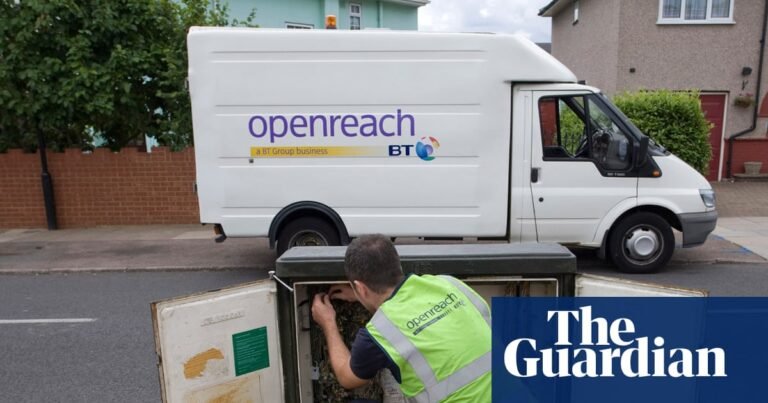From scissors being brandished as weapons to verbal abuse and being trapped during a home visit, the number of reported incidents of abuse and assault on telecoms engineers is on the rise.
Openreach, the BT subsidiary that maintains the vast majority of the broadband network serving UK homes and businesses, recorded 450 reports of abuse and assault in the year to the end of March.
The number of incidents involving Openreach employees was up 8% year-on-year, a 40% increase on 2022-23 and seven times the volume reported almost a decade ago.
Abuse and assault has for the first time become the largest cause of injury to Openreach office staff and its 22,000 field engineers. Managers believe the number of incidents is even higher, as many cases are not reported by staff.
“I used to be worried about people falling off ladders, road traffic accidents or tripping over potholes,” said Adam Elsworth, health and safety director at Openreach. “But actually we have seen a steady increase in violence and abuse.
“A quarter of all the accidents we record are now someone being attacked or abused, and it is continuing to rise. And when I look at these incidents I struggle to see the rationale behind the level of escalation.”
Incidents reported by engineers include being shouted at, sworn at or spat it, the blocking of vehicles, being shaken off stepladders, or pushed down stairs while working at someone’s home.
There are also reports of racial abuse, inappropriate and threatening behaviour towards female engineers, homeowners preventing staff from leaving and specific incidents such as scissors being brandished like a weapon and a customer repeatedly slamming a vehicle door on an engineer’s leg.
For Openreach, around half of incidents are in public locations, 45% are at homes and the remainder occur at the company’s yards or estate.
Elsworth said Openreach was trialling a “panic alarm” on engineers’ mobile phones, which connects them in seconds to a monitoring centre that has the power to directly dispatch emergency services if required.
“If an engineer is at someone’s home, that is quite a vulnerable space to be,” he said. “Some of the incidents are quite disproportionate and have created a wariness among engineers. When someone has been attacked, they are then thinking every time they knock on a door what could be coming next.
“A number of these cases do get reported to police, particularly in the case of the more severe ones. It is difficult when there is a threat element.”
While Openreach faces the largest number of incidents, it is also a growing issue for other telecoms operators.
Virgin Media O2, which has around 4,000 employees working on its cable network and cell masts, reported 26 incidents last year covering physical encounters, verbal abuse and threatening behaviour.
However, so far this year the reported number of incidents is up significantly, tracking at a rate that would mean the number doubling for the full year.
skip past newsletter promotion
Sign up to Business Today
Get set for the working day – we’ll point you to all the business news and analysis you need every morning
Privacy Notice: Newsletters may contain info about charities, online ads, and content funded by outside parties. For more information see our Privacy Policy. We use Google reCaptcha to protect our website and the Google Privacy Policy and Terms of Service apply.
after newsletter promotion
“Our frontline teams work tirelessly to provide reliable mobile and broadband services millions of customers rely on every day,” said a spokesperson. “A single incident of abuse or threatening behaviour is one too many, and we’re committed to ending workplace violence and keeping our people safe.”
At Sky the number of incidents involving engineers in the field reached 99 last year, although the company said it was not seeing any upward trend this year.
Sky said it was back to pre-Covid levels of incidents after an increase during the pandemic, with a peak of 392 reported incidents in 2021.
The newly-formed VodafoneThree collated about 40 to 50 incidents, while BT-owned EE did not reveal numbers but said that the figure was low.
Last month, the major telecoms companies were among 100 co-signatories of an open letter from the Institute of Customer Service (ICS) calling on the government to amend the crime and policing bill.
The bill will make it a standalone offence for assault on a retail worker, the sector that has been the most vocal about the safety and security of staff.
As it stands the bill does not offer any protection for customer-facing workers across other sectors – including telecoms and infrastructure – with the ICS estimating that about 60% of the UK workforce operates in some form of customer-facing role.
“You hear about the situation in sectors such as retail, trains, public transport but telecoms is a bit of a forgotten child in this,” said Elsworth. “But when you are talking about engineers in someone’s home, well that’s quite a unique challenge.”
